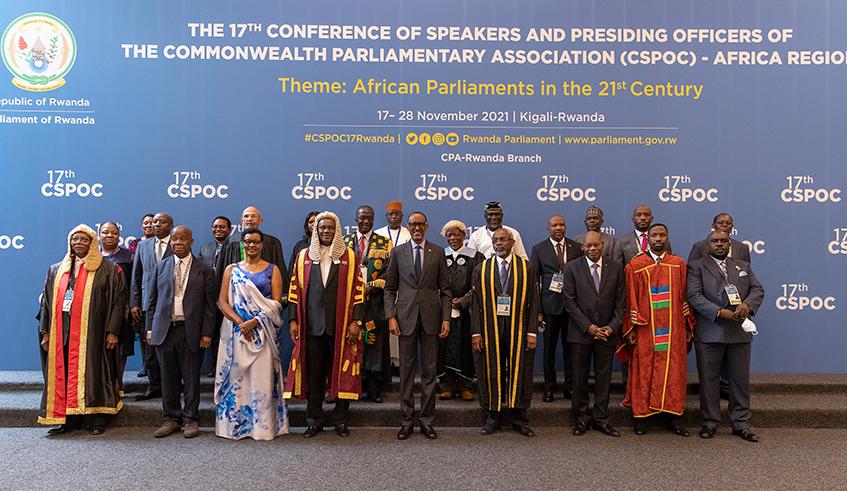Africa-Press – Rwanda. President Paul Kagame has called upon all national parliaments to back the treaty on African Medicines Agency (AMA), which has now entered into force.
The President made the observation on Wednesday, November 24, as he opened the 17th Conference of Speakers and Presiding Officers of the Commonwealth (CSPOC) – Africa Region. The conference focuses on, among other topics, retooling Parliaments for effective and efficient oversight.
“This is a landmark agreement that will help ensure that vaccines and medications in Africa are both high-quality and locally produced,” he said of the African Medicines Agency treaty.
The AMA Treaty was adopted by Heads of State and Government during their 32nd Ordinary Session of the Assembly on 11 February 2019 in Addis Ababa, Ethiopia.
Delegates during the opening of the 17th Conference of Speakers and Presiding Officers of Commonwealth in Kigali, on November 24. Photo: Village Urugwiro.
This treaty went into force on November 5, 2021, 30 days after the deposit of the 15th instrument of ratification, by the Republic of Cameroon at the African Union Commission.
As of November 9, 2021, 17 member states including Rwanda had ratified the treaty establishing the continental agency and deposited the legal instrument of ratification to the Commission. In total, 26 member states had assented to the treaty.
AMA is a specialised agency of the African Union (AU) intended to facilitate the harmonisation of medical products regulation throughout the AU in order to improve access to quality, safe and efficacious medical products on the continent.
Following a similar model of the European Medicines Agency, AMA is intended to have a wide scope covering medical products – medicines (including traditional and ‘modern’ ones), vaccines, blood and blood products, diagnostics and medical devices.
Such efforts are intended to address a deficiency in drug production and challenges posed by counterfeit and substandard products. Among its functions, AMA will develop systems to monitor, evaluate and assess the comprehensiveness of national medical products regulatory systems with the view to recommend measures that will improve efficiency and effectiveness.
According to the World Health Organization (WHO), Africa suffers more than its fair share of communicable and non-communicable diseases. Over 90 percent of the world’s malaria deaths and 70 percent of all people living with HIV/AIDS are in Africa.
WHO also indicates that 95 percent of all medicines used in Africa are imported and the continent accounts for just 3 percent of all medicine production globally.
Moreover, WHO says that the Covid-19 pandemic has further exposed Africa’s vulnerabilities in ensuring access to vital drugs, vaccines, and health technologies and more and more African governments view the supply of safe, effective, and affordable medicines and vaccines as a national security issue.
It indicated that boosting local production will save lives, improve public health and strengthen African economies, including supporting local jobs. It should also trigger the sharing of crucial technologies.
Increase funding
Lentheng Ntombi Mekgwe, Speaker of Gauteng provincial legislature in South Africa told The New Times from Kigali that members of the executive councils like Presidents and Ministers of Health must ensure that they invest more resources “to ensure that we create our own research and development capacity.”
“We do have experts in our own countries, and yet we are not giving them enough support to be able to actually do some research and come up with a vaccine or health protocols that will help all of us,” she said.
“Therefore, as African countries we need to come together and develop that kind of support to ourselves before we can even look off-shore to get the support from other countries,” she said.
Speaking at the opening of the conference, Justin Muturi, Speaker of the Kenyan National Assembly, said that the Covid-19 pandemic has exposed the vulnerability of African Governments in terms of the ability to adequately and effectively deal with shocks to the economic and social structures.
“Limitations in health financing are far below the 15 percent of annual budgets agreed upon by Heads of State of African Union countries at the Abuja Declaration of 2001,” said Muturi, who is also the outgoing Chairperson of Commonwealth Parliamentary Association (CPA) Africa-Region.
Amos Masondo, Chairperson of the National Council of Provinces of the Republic of South Africa said that if anything, the Covid-19 pandemic has demonstrated that Africa needs to develop her own capacity to address her challenges.
“We saw how wealthy nations elsewhere pre-ordered billions of doses as a means of securing advanced access to vaccines [against Covid-19], something which placed the low and middle-income countries in a predicament,” he said.
For More News And Analysis About Rwanda Follow Africa-Press






